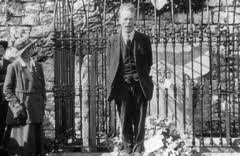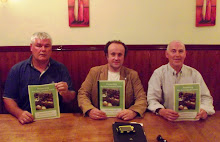Other business transacted on opening day included the drafting of a short, provisional constitution; the issuing of a rhetorically high-minded message "to the free nations of the world''; and the adoption of a Democratic Programme, unanimously approved without debate.
This Democratic Programme would later become a point of devision as the treaty split the Irish Republican government and army.
 |
| The First Dail |
Despite being passed unanimously at that first meeting, the Democratic Programme was not accepted by everyone from the start. Some seen it as a necessary pay back to the Labour party, who had stood by to allow Sinn Féin a clear run at the 1918 elections. (In fact the programme was drafted with the assistance of Thomas Johnson, the leader of the Labour Party.) They did not see it has something that belonged to the nation they were fighting to build.
The Irish Times of the day discerned a deep division within Sinn Féin between moderates and extremists. On one side there was “a body of idealists who nurture themselves quite honestly on visions of an independent, but peaceful and pious Ireland”. On the other, there were those who planned “to apply the principles of Lenin and Trotsky to Irish affairs. It is working for the disintegration of society and the confiscation of all property, public and private”.
Irish nationalists in general had always believed that an independent Ireland would be prosperous and just; Sinn Fein's social policy specifically envisaged the development of national resources for the public good. The Democratic Programme went much further however.
It was a radical manifesto with some striking phrases, e.g. "no child shall suffer hunger or cold from lack of food, clothing or shelter''. The programme outlined a socialist policy which included: the public ownership of the means of production, natural resources and "wealth"; state provision of education for children and care for the elderly; ensuring that children receive food; promotion of industrial development as well as the exploitation of natural resources. The historian Diarmaid Ferriter (2004) has argued that this document "was an indication that only a certain type of nebulous, ambiguous rhetoric concerning equality and redistribution would be tolerated by Sinn Féin." The Labour Party inserted a clause that private property was to be subordinate "to the public right and welfare."
IRB leaders, like P S O'Hegarty, single-mindedly concerned with ending British rule, dismissed it as "socialist theoretical high-sounding jargon''. It hardly reflected the mind of a lower middle-class Dail and certainly not the sentiments of a recently-established peasant proprietorship.
One of the greatest supporters of the Democratic Programme was the great Irish Socialist, Liam Mellowes. Mellowes, who spent the Summers of his youth in North Wexford, felt that the Anglo-Irish Treaty as signed to be a betrayal of the Irish Republic, saying, in the Treaty Debates of 1921–22:
“ We do not seek to make this country a materially great country at the expense of its honour in any way whatsoever. We would rather have this country poor and indigent, we would rather have the people of Ireland eking out a poor existence on the soil; as long as they possessed their souls, their minds, and their honour. This fight has been for something more than the fleshpots of Empire.”
 |
| Liam Mellowes at Bodenstown |
Today, Sinn Féin continue to site the Democratic Programme of 1919 as an important historical text, which all the Irish governments since have failed to even try and implement. The spirit of this document lives on today in the republican socialist tradition, and is as relevant to us now as it was on that day in January 1919.

























.jpg)







No comments:
Post a Comment